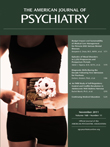Response to Rietdijk et al. Letter
To the Editor: Rietdijk and colleagues provide an interesting perspective. In relation to the DSM-5 work on attenuated psychosis syndrome, there is no doubt that this is an important clinical problem associated with hope for better outcomes with earlier intervention, but whether to add attenuated psychosis syndrome as a new class is far from settled. The field trials are designed to determine the reliability of diagnosis outside the expert centers, and attenuated psychosis syndrome is a disorder or clinical syndrome for which the only question of false positives is the reliability and validity of case ascertainment. Transition to a psychotic syndrome is one of many possible outcomes, and failure to make this transition is not a false positive for attenuated psychosis syndrome. Attenuated psychosis syndrome is not defined as a risk state for primary prevention but as a disorder in which secondary prevention of a psychosis is a therapeutic aim.
An illness does not have to be severe to merit clinical attention, and stigma occurs for many reasons in people whose behavior deviates from peer norms, but the diagnostic term should be selected with care. Immediate problems with “pluripotent dopamine sensitization risk syndrome” are that attenuated psychosis syndrome is a disorder by definition, not a risk state, and that dopamine sensitization may be involved in a number of disorders associated with psychosis, but its role in attenuated psychosis syndrome is not known.
In any case, if the results of the DSM-5 field trials support reliable application in nonexpert settings, our work group will have an interesting debate as to the placement in text or appendix and what name is best for the syndrome.



